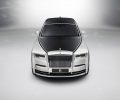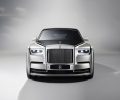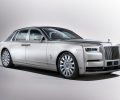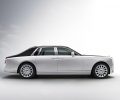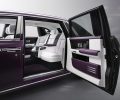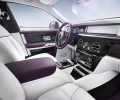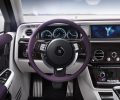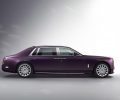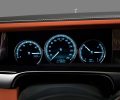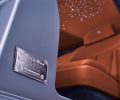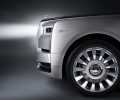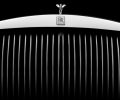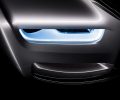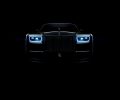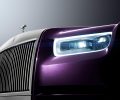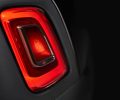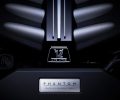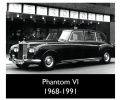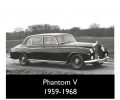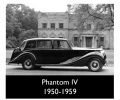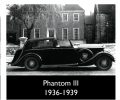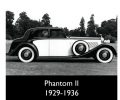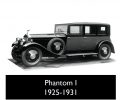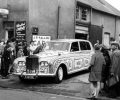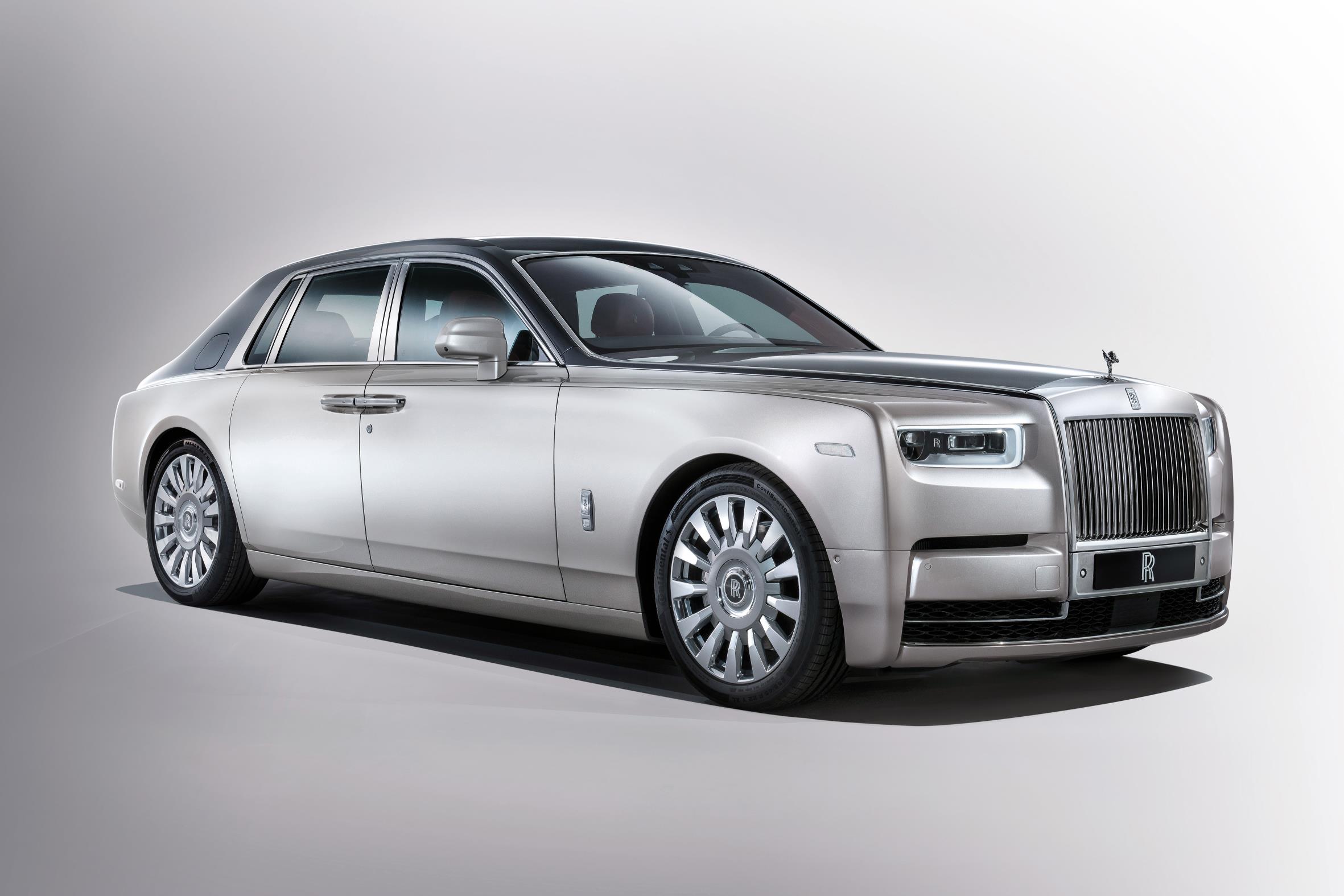
New Phantom at a glance
- A wholly new, contemporary design interpretation of Rolls-Royce Phantom DNA
- The all-new aluminium ‘Architecture of Luxury’ underpinning New Phantom ensures the architectural and proportional lineage of Rolls-Royce while delivering a whole new level of ‘Magic Carpet Ride’ because it is lighter, stiffer, quieter and more technologically advanced.
- ‘The Embrace’ enhances the sense of occasion and effortlessness of entry into New Phantom. As the patron settles in to the car, an assistant or valet steps forward and lightly touches the sensor on the door handle so it whispers closed of its own accord, enveloping the occupant in ‘The Embrace’.
- ‘The Suite’ re-defines Rolls-Royce comfort and refinement inside – already the benchmark for any mode of conveyance.
- ‘The Gallery’ is an unprecedented new concept in luxury. Reinterpreting the motor car’s dashboard for the first time in 100 years, patrons will be able to commission a truly individual work of art that spans the width of The Gallery in their New Phantom.
- All new 6.75 litre twin-turbo V12 engine is the silently beating heart of New Phantom.
- New Phantom is the most technologically advanced Rolls-Royce ever.
“From its debut in 1925, a Rolls-Royce Phantom has been the choice of the world’s most influential and powerful men and women, and as a result, a constant presence at history’s most defining moments. As this next chapter in the Rolls-Royce story opens, the New Phantom points the way forward for the global luxury industry. It is a creation of great beauty and power, a dominant symbol of wealth and human achievement. It is an icon and an artwork that embraces the personal desires of each of our individual customers.” Torsten Müller-Ötvös, Chief Executive Officer, Rolls-Royce Motor Cars.
Introduction
From the moment Sir Henry Royce introduced the Rolls-Royce Phantom in 1925 it was judged ‘The Best Car in the World’ by the cognoscenti. As a result it has conveyed some of the world’s most influential and powerful men and women to the most defining historical moments over the last 92 years.
Every new Phantom that has subsequently appeared has successfully retained the title of ‘Best Car in the World’ as a result of Rolls-Royce’s tireless pursuit of perfection, visionary engineering, aesthetic acuity and deep understanding of what the world’s leading luxury item should be. Quite simply, Rolls-Royce has innovated for almost a century to set the benchmark and satisfy the most discerning luxury patrons.
A new benchmark will be set today as the New Phantom – the eighth generation of this great nameplate – arrives. Not satisfied with simply launching a motor car that is a wholly contemporary design interpretation of Phantom DNA and a technological tour de force, Rolls-Royce has revolutionised the luxury car industry itself by shifting away from the status quo of shared platforms to an entirely new luxury business model.
As the next chapter in the Rolls-Royce story opens, the New Rolls-Royce Phantom points the way forward for the global luxury industry.
Peter Schwarzenbauer, Chairman of Rolls-Royce and Member of the Board of the BMW Group said, “The global introduction of a new Rolls-Royce is always a very special moment within the BMW Group. This particular occasion is all the more special because we are introducing an all-new Phantom, the flagship of the Rolls-Royce brand and the world’s foremost luxury product. New Phantom is a powerful statement of design, engineering and Bespoke expertise and I am delighted with the response we have received from our many highly discerning customers worldwide. The BMW Group remains fully committed to the future of Rolls-Royce Motor Cars and is proud of the many achievements made by the brand since its acquisition.”
The Genesis of New Phantom
Quite contrary to how other so-called luxury manufacturers are trying to realise economies of scale by sharing platforms with mass market manufacturers, Rolls-Royce concluded that the future of true luxury lies in true small-volume manufacture of a dedicated ‘Architecture of Luxury’.
“This realisation was a moment of clarity about the destiny of Rolls-Royce,” reflects Torsten Müller-Ötvös, Chief Executive Officer of Rolls-Royce Motor Cars. “Every one of our customers – each a connoisseur of luxury in the extreme – were asking for something more individual to them, not less. We were adamant that that was what they should have.”
“Key to Rolls-Royce realising its vision of being the world’s leading luxury brand, today and in the future, is an architecture that spans the entire Rolls-Royce family,” comments Philip Koehn, Director of Engineering. “The Architecture of Luxury will carry every future Rolls-Royce, not just the New Phantom. Project Cullinan and eventually the next Ghost, Wraith, Dawn will ride on this architecture, as well as future coachbuild projects.”
“Phantom VII’s spaceframe architecture was a good starting point and inspiration, but we wanted to do much more,” adds Giles Taylor, Director of Design. “The Architecture of Luxury gives me the canvas to protect the lineage and brand integrity of Rolls-Royce without compromise. Starting with New Phantom, I have the framework to create a future range of true Rolls-Royces. In essence, this is one big coachbuild project.”
“Our approach has been to forge long-term relationships with smaller suppliers run by families that will focus on us, giving us much more attention and therefore results that live within a quality expectation far beyond any other automotive concern,” continues Koehn. “For a brand to operate in such a manner within a larger automotive group is unheard of and truly revolutionary.”
What is the Architecture of Luxury?
The Architecture of Luxury is an all-aluminium spaceframe architecture designed by Rolls-Royce engineers that will underpin every future Rolls-Royce beginning with the New Phantom. As such, no future Rolls-Royce will be of monocoque construction as used by mass-manufacturers and some mass-luxury brands.
It is a truly revolutionary approach for the motor industry, and one that is informed by Rolls-Royce’s standing as a luxury house in the business of cars. Whilst the majority of so-called luxury manufacturers are limited to sharing individual platforms in a specific sector with mass brands for say their SUV or GT offerings, thereby introducing unacceptable compromise, Rolls-Royce will be uncompromising in only using its own architecture across all its motor cars, whatever the sector.
It has been designed and engineered from the ground up in such a way as to be scalable to the size and weight requirements of different future Rolls-Royce models, including those with different propulsion, traction and control systems, thus underpinning the long-term future product roadmap.
Approximately 30 per cent more rigid than the spaceframe architecture on which sat Phantom VII, the new architecture is at the heart of how the next generation of Rolls-Royces delivers the Rolls-Royce experience in terms of ride comfort, acoustic comfort, seat comfort, exterior presence and interior space.
Engineering a Modern Masterpiece
The New Phantom will be the first of a new generation of Rolls-Royces to benefit from the creation of the Architecture of Luxury. This new architecture serves as the foundation on which this eighth generation of Phantom reaffirms its position as ‘The Best Car in the World’ by taking the best fundamentals and making them better.
The first major benefit of the new architecture for the New Phantom are lightness, increased stiffness, efficient production of standard and extended wheelbase bodies and uncompromised exterior surface design.
The all-new aluminium spaceframe structure delivers extraordinary car body stiffness for exceptional ‘best-in-class’ functional performance whilst also being lighter. Indeed New Phantom is 30 per cent more rigid than its predecessor, leading to better ride comfort.
Accompanying the increased stiffness of the spaceframe is a best-in-class high comfort chassis with air suspension and state-of-the-art chassis control systems, delivering peerless ‘effortless’ ride and handling and optimal vibration comfort performance.
A new double-wishbone front axle and 5-link rear axle deliver astounding levels of control over lateral roll and shear forces and delivering incredible agility and stability, as does the addition of four-wheel steering, all contributing to an undisturbed passenger whatever the driving conditions.
Rolls-Royce’s celebrated Magic Carpet Ride also improves as a result of the new lighter architecture, and the latest generation of self-levelling air suspension. The suspension makes millions of calculations every second as it continuously varies the electronically controlled shock absorber adjustment system – reacting to body and wheel acceleration, steering inputs and camera information. In addition, the Flagbearer – evocative of those men who were required by law to carry a red flag ahead of early motor cars – adds a stereo camera system integrated in the windscreen to see the road ahead, adjusting suspension proactively rather than reactively up to 100km/h.
The most silent motor car in the world
Incalculable effort was expended to create ‘the most silent motor car in the world’ including 6mm two-layer glazing all around the car, more than 130kg of sound insulation, the largest ever cast aluminium joints in a body-in-white for better sound insulation, and use of high absorption materials.
Acoustic insulation from road noise has been helped by the employment of double skin alloy on areas within the floor and bulkhead of the spaceframe. This is a feature unique to New Phantom. Further noise insulation by inserting dense foam and felt layers are between these skins to provide sound insulation not witnessed before in the car industry.
In addition, high absorption layers within the headliner, in the doors and in the boot cavity have further aided insulation and reduced reverberation. Rolls-Royce also worked closely with its tyre supplier to invent ‘Silent-Seal’ tires – which feature a specific foam layer placed inside the tyre to wipe out tyre cavity noise and reduce overall tyre noise by 9db, meaning that conversation within the car is completely effortless.
All in all it is a perfect 360° cocooning effect in a motor car that is approximately 10 per cent quieter than its predecessor at 100km/h. Indeed, when Rolls-Royce’s acoustic test engineer first reviewed results road and vibration tests, the sound levels were so low they had to check their instruments were calibrated correctly.
The heart of a Rolls-Royce – the magnificent V12 reinvented
At the heart of every Rolls-Royce of the modern period lies the power of a V12 engine. At the beginning of this next chapter of Rolls-Royce’s existence, and with the creation of the Architecture of Luxury, the New Phantom also benefits from a completely new engine.
With the focus on creating the most silent motor car in the world, a completely silent engine was also required, and that meant more low-end output at lower revs to ensure that silence. Hence a completely new, 6.75-litre V12 powertrain has been engineered for New Phantom, in place of the previous naturally aspirated V12 engine.
The new V12 Phantom engine employs two turbo chargers that contribute to a low-end torque output of 900Nm at an incredibly low 1,700rpm whilst also delivering 563bhp or 420kW of power, resulting in calm low speed progress associated with state occasions and an unfussed surge of power when one needs to press on. The addition of Satellite Aided Transmission (SAT), married to a ZF 8-Speed gearbox also ensures that the driver is prepared for whatever the road has in store for them.
The most technologically advanced Rolls-Royce ever
Another benchmark, the Electronic Architecture of the New Phantom is the largest ever component produced by the BMW Group, let alone Rolls-Royce, helping to make New Phantom the most technologically advanced Rolls-Royce ever.
This central nervous system connects and controls all the various advanced intelligence systems of New Phantom, making it the most advanced luxury motor car available. Some, but not all, assistance systems on-board New Phantom include: Alertness Assistant, a 4-camera system with Panoramic View, all-round visibility including helicopter view, Night Vision and Vision Assist, Active Cruise Control, collision warning, pedestrian warning, cross-traffic warning, lane departure and lane change warning, an industry leading 7×3 high-resolution head-up display, WiFi hotspot, and of course the latest navigation and entertainment systems.
New Phantom – A Contemporary Design Masterpiece
“Phantom is the epitome of effortless style, an historical nameplate that occupies a rarefied space in the luxury constellation and conjures a rare magic all of its own. New Phantom raises a glass to an illustrious design legacy whilst forging a modern and revitalised presence for the next era of Rolls-Royce design.”
Giles Taylor, Director of Design, Rolls-Royce Motor Cars
The first Rolls-Royce to be built on the new Architecture of Luxury, the New Phantom is a wholly new and contemporary interpretation of the Phantom DNA, delivering new levels of iconic presence and an increased elegance of line suggesting both poise and stability at speed and an unrushed Grand Arrival.
On first glance the New Phantom is remarkable in its purity. Thanks to the new Architecture of Luxury and new engineering processes, the precision body joining process ensures there are few, if any, visible join lines between body panels, giving New Phantom the appearance of being hewn from a solid block of aluminium. It is truly a triumph of design and engineering departments working hand in hand to create a beautiful masterpiece.
Its opening gesture immediately demonstrates a radical contemporisation of Phantom, through the reimagining of the Pantheon grille at the heart of the design. The strong portrait grille is raised higher than that of Phantom VII today, also resulting in a positioning of the Spirit of Ecstasy approximately a half inch higher. It is redolent of the futuristic design first hinted at on the grille of VISION NEXT 100 – codename 103EX last year, but also influenced by the James Young-era Silver Cloud.
However, unlike 103EX and all previous Phantoms, New Phantom’s grille is for the first time integrated into the surrounding bodywork. The resulting effect is a cleaner, reduced design with modernity and clarity, allowing all New Phantom’s lines to connect with this iconic statement of power and flow from it.
In addition, a new purposeful headlamp graphic gives a confident and focused expression with fresh, frosted internals that feel open and optimistic, whilst accommodating an expressive ring of daytime driving lights and the most advanced laserlight system of any motor car that at night casts light well over 600 metres down the road.
This flow is achieved through the handcrafting of beautiful, authentic materials and subtle creases in the bodywork. The key front to rear line begins inboard from the top edge of the grille moving outwards along the body to the rear, lending a sense of dynamism to New Phantom, while the front wing line fades just after the door handle suggesting pace and fluidity.
The grille itself is created from hand-polished stainless steel, a material that highlights the precious and timeless nature of this New Phantom and its modern architecture through the use of a visually warm and highly tactile material. Emanating from the upper tips of the grille, the polished stainless steel strips curve along the upper edges of the bonnet and around the windscreen, accentuating the length of the bonnet and seamlessly blending the cabin to the lower volume as though swept by the wind.
From the side, New Phantom has the iconic 2:1 proportions that have endeared so many to every generation of Phantom, featuring a short front and long rear overhang, an upright front and a flowing rear. The rear lines of the car in side view circle forward to the waft line and lead the eye back through the front wheel. The largest single-piece of hand-polished stainless steel on any motor car is the side frame finisher of New Phantom. It beautifully accentuates the elegant stance of the car and with a rounded softer feel, preserves the iconic wide C-pillar for privacy, while allowing the eye to transition easily to the rear. Furthermore, a single polished stainless steel strip is placed on the sill of the Phantom Extended Wheelbase to differentiate it.
“The side view design theme of Phantom recalls the elegance of Phantom V. By separating the front wing line from the waist line, we introduce a sense of movement and this line circles back under the car inferring a lighter, fleetness of foot,” comments Taylor.
A lot happens at the back of New Phantom as the design evokes the beautiful flowing rears of the 1950’s and 1960’s Phantoms. The rear glass, again defined by an impeccably crafted stainless steel frame, is more raked and the rear lines sleeker than the previous Phantom, whilst a subtle scallop on the rear roof line that hovers above the rear occupant’s assures one of preserved head room.
The eye is also drawn inboard by a neat tapered tail, which is constructed of super formed aluminium to ensure more join-free surfaces and flowing bumper lines around the rear light graphic. Subtle creases in the bootlid that hark back to the more pronounced boots of earlier Phantoms flow on to a pronounced boot lid finisher. Again in stainless steel this feature echoes the front grille whilst allowing the airflow to gracefully depart from the rear of the car. Even the jewel-like rear light cluster is furnished in exquisite detail with the famous Double-R badges etched in.
Hand-polished stainless steel also envelops the first touchpoints of New Phantom – the handles on the iconic coach doors. Unlike the trend for insubstantial fared in handles, Rolls-Royce understands that the substance of a Rolls-Royce door handle is key to the owners every day physical experience of their motor car, and the feel of this beautiful material under the hand is highly satisfying to them.
The final visual expression of Phantom is its wheels, which of course conform to the golden mean of Rolls-Royce design proportion. Essential to providing the sensation of flight on land, the largest high-value alloy wheel ever employed on a Rolls-Royce is offered. At 22-inches, the diameter when shod in Rolls-Royce’s Seal Technology Tyres’ delivers a Magic Carpet Ride never experienced in a Rolls-Royce before.
Phantom: The World’s Leading Luxury Item
Stepping aboard the New Phantom is an occasion in itself. The coach doors stand open. The only choice is whether one drives or is driven. As the patron settles into the car, an assistant or valet steps forward and lightly touches the sensor on the door handle. The door automatically whispers closed of its own accord, enveloping the occupant in ‘The Embrace’ of the World’s Leading Luxury Item.
Fundamental to the rear occupant’s experience and enjoyment of their New Phantom is this ‘Embrace’. It re-defines Rolls-Royce comfort and refinement – already the benchmark for any carmaker – to create a detoxifying environment whilst cocooning the occupant in the finest of materials, whilst all four doors are enhanced with this new technology to enfold the occupant. The rear and now front doors can also be effortlessly closed from the inside.
‘The Embrace’ is the vision of Giles Taylor, inspired by his creation of 103EX. He has taken great strides towards evoking the spirit of 103EX with the futuristic interior design of the New Phantom, where nothing detracts from calmness and tranquillity in this particular sanctuary. Technology is hidden until required, spaces and surfaces are clean, and the eye rests only on beauty as if in an art gallery.
As one would expect from a Rolls-Royce, the environment is crafted from the most precious and contemporary of materials. What is unexpected is the feeling of lightness and simplicity, an effortless elegance.
From one’s position on beautifully enhanced rear seats, the occupant is borne along in near-silence as if on a pillow of air, thanks to much enhanced ride and acoustic comfort. When in need of a space to reflect on issues of importance or simply lost in thought, ones imagination is inspired by the largest Starlight Headliner ever seen in a Rolls-Royce. High gloss, exquisitely tactile wood panelling that can be commissioned for the door interiors, centre consoles, dashboard and picnic tables, encircles the passenger in only the most beautiful and authentic materials.
The lines at the front of the interior lean forward suggesting a progressive nature, while in contrast the rear doors lean back, relaxing the character of the rear environment. When designing the armrests, the J-Class yacht was heavily referenced as a design inspiration. The tension and ‘hull’ of the armrests are directly influenced by these large sailing yachts.
The seats are newly sculpted and hand-crafted to deliver even more comfort. They feature a strong horizontal element through the top of the seat, imparting a sense of width, comfort and presence, whilst visually enhanced with a vertical interpretation of the seat ‘bullet’ previously seen in Wraith and Dawn. The sweep of wood panelling across the back of the front seats have clearly been influenced by the famous Eames Lounge Chair of 1956, a design so regarded by patrons of luxury that it is part of the New York Museum of Modern Art’s permanent display.
Cleverly secreted behind the wood panelling on the rear of the front seats are the Rear Picnic tables and Rear Theatre Monitors, which are electrically deployed and retracted at the effortless touch of a button, ensuring an uncompromised theatre experience. Rolls-Royce’s customary attention to detail even dictates that the seat controls are repositioned from the centre armrest to a more intuitive position for the user.
Phantom patrons will be able to commission different seating choices best suited to their requirements. Choices include the more intimate lounge seat, individual seats with occasional armrest, individual seats with fixed centre console and the newly introduced sleeping seat.
The new fixed rear centre console receives significant enhancement, by incorporating a drinks cabinet with whisky glasses and decanter, champagne flutes and coolbox. In any configuration effortless conversation is aided with the very careful angling of the rear seats. This ensures occupants are able to talk to each other without straining their necks.
The sense of touch is also satisfied by the continued use of the finest and most authentic materials throughout the interior. Every item of switchgear is made from metal – such as the iconic eyeball vents and organ stop controllers, seat and light switches, violin key window switches – glass or wrapped in the finest leather as dials including the new front and rear Spirit of Ecstasy Rotary Controllers.
Meanwhile, further unseen levels of comfort and refinement are introduced into the Phantom Suite with heated surfaces operated in conjunction with the seat heating functionality. Areas throughout the interior that are now heated include the front door armrests, front centre console lid, lower C-Pillar, rear side armrests with all individual seats, and rear centre armrest.
‘The Gallery’ – an unprecedented new concept in luxury
At the heart of the New Phantom’s wholly modern design aesthetic is ‘The Gallery’, a wholly contemporary and luxury reinterpretation of a motor car’s dashboard and instrument panel area.
While the character of the monolithic, upright dashboard pays contemporary homage to Rolls-Royce models of the past, with one clean, symmetrical surface, the main fascia veneer takes the eye from the lower centre up and outwards to create a sense of width.
All of the elements within ‘The Gallery’ are enclosed in an uninterrupted swathe of toughened glass that runs the full width of the dash area. Within it, the instrument digital dials are framed with chrome, adding a degree of jewellery and continuity throughout the front of the interior.
Behind the physical chrome surrounds of the instrument dials, Rolls-Royce has embraced a more futuristic approach to clearer instruments for the driver, something requested by Rolls-Royce customers around the world. 12.3 inch TFT colour displays with LED backlighting now communicate all driver information from within the round chrome surrounds, with the displays themselves designed with clear and beautiful virtual needles, Rolls-Royce jewellery-like chaplets and clear lettering.
In addition to speed, power reserve, fuel and temperature levels, the displays also react to provide essential information on cruise control settings, navigation instructions, driver assistance systems and a whole host of other information.
Also behind the glass of ‘The Gallery’ are housed the analogue clock – a nod the fact that it is “the loudest sound you can hear in a Rolls-Royce …” and the central information screen which can be retracted behind the centre stack when not in use.
The standard clock features a dark face and the surround is finished in black leather. However, each Bespoke Clock features a more intricate design, including a lighter backlit face with crystal effect details and counterweighted hands, and is finished to match the material selected within ‘The Gallery’.
The Art of Movement
“Art is at the heart of the conception of the New Phantom’s interior,” comments Taylor. “As an interest, we know that a huge number of our clients are patrons of art and indeed have their own private collections. Art is a binding factor for many of them.”
This binding factor was what inspired Taylor to radically reinterpret the motor cars’ dashboard from being a dead expanse into a riveting focal point. “I wanted to take a motoring constant that has existed for a century, but served little purpose but to hide airbags and componentry, and give it another purpose, space to breathe,” comments Taylor.
Hence the real purpose of ‘The Gallery’ – to be just that, a gallery.
By realising a space in the upper dashboard, Taylor envisioned a new use – to create an area for Bespoke works of art and thereby multiply the personalisation potential for every owner of a New Phantom.
“In the 18th century, miniatures were highly fashionable and valuable items of art that allowed their owners to carry images of their loved one with them wherever they travelled. I really loved that idea of taking your art with you, when travelling, and so I acted on it,” continues Taylor. “Now, our clients will be able to do the same.”
As a Bespoke Commission, customers will be able to choose a favoured artist or designer to work with Rolls-Royce to create a truly individual work of art that spans the width of ‘The Gallery’ in their New Phantom.
Rolls-Royce has already worked with a number of artists, designers and design collectives to demonstrate what kind of creations are possible to put behind the glass of ‘The Gallery’ for the owners pleasure. Works as various as an oil painting inspired by the South Downs of England in Autumn by renowned Chinese fine artist Liang Yuanwei, a gold-plated 3D-printed map of an owners DNA created by the enfant terrible of German product design Thorsten Franck, a hand-made stem of the finest porcelain roses handmade by world renowned porcelain manufacturer Nymphenberg or an abstract design in silk by young British artist Helen Amy Murray are some of the creations inspired by this most unusual of Gallery spaces.
In addition to these Bespoke Commissions, which will take longer to deliver, Rolls-Royce’s craftspeople and designers at the Home of Rolls-Royce in Goodwood have created a stunning collection of forward-looking Gallery treatments of silk, wood, metal and leather, which are available immediately.
Conclusion
The Architecture of Luxury, ‘The Gallery’, The Embrace, The Art of Movement, the best possible materials in the world and peerless Rolls-Royce design and engineering; the New Rolls-Royce Phantom resets the benchmark not only as ‘the Best Car in the World’, but as the world’s leading luxury item. As the next chapter in Rolls-Royce’s story opens, the New Rolls-Royce Phantom points the way forward for the global luxury industry.
The Great Phantoms
From when Sir Henry Royce introduced it as the successor to the Silver Ghost in 1925, a Rolls-Royce Phantom has stood witness to history’s most defining moments over the past 92 years, having conveyed some of the world’s most influential and powerful men and women to those momentous occasions.
Its standing as the longest existing nameplate in the world of motoring is testament to Phantom’s enduring importance to every generation’s leaders; from heads of state to generals, royalty to rock stars, stars of the silver screen to titans of industry.
Rolls-Royce began producing the Phantom I in 1925. It was developed in great secrecy, with the project code-named Eastern Armoured Car. This suggested Rolls-Royce was intent on producing the kind of military vehicles used in the First World War, most famously by Lawrence of Arabia. Sections of armour plate were left lying around the factory to confuse curious competitors eager to glean the secret of making the ‘Best cars in the World’.
The Phantom I was an instant success. The new 7.668-litre straight-six engine gave the car a fresh spring in its step. When General Motors opened a testing ground in Michigan, it was discovered that no cars could manage even two laps of the 4-mile circuit at full throttle without damaging their engines’ big ends – where the piston attaches to the crankshaft. However, Phantom I performed with consummate imperiousness and managed that, and more, at a steady 80mph without failure.
Sir Henry Royce’s restless desire to, in his own words, “take the best that exists and make it better” quickly led to the creation of the Phantom II in 1929, this time with a totally new chassis, which significantly improved the handling, as well as a re-designed engine.
The next Phantom, the third in the line, was to be Sir Henry Royce’s last project. He passed away in 1933, aged 70, about 12 months into the development of the car. The finished model, with its peerless 12-cylinder engine, was unveiled two years later and production lasted from 1936 until the Second World War. The final chassis was produced in 1941, although the war meant it did not receive its coachwork until 1947. No announcement came about a replacement and it looked as if the most compelling story in automotive history was over.
In 1950, Phantom IV appeared. The car was originally intended to be a one-off for Prince Philip and the then Princess Elizabeth. However, once seen, a further 17 were commissioned exclusively for other royal families and heads of state around the world. Fitted with a straight-eight engine and featuring a revolutionary new gearing treatment, it performed superbly at low speeds – essential for taking part in ceremonial parades – and featured the kneeling version of the famous Spirit of Ecstasy bonnet mascot.
The Phantom V was produced between 1959 and 1968 and 516 of this hugely successful model were made for clients including the Queen Elizabeth The Queen Mother, governors of Hong Kong, King Olav of Norway, Elvis Presley and most famously, John Lennon.
The long-running Phantom VI (1968-90) carried on the royal connection, notably with the Silver Jubilee Car, a raised-roof version presented to Queen Elizabeth II in 1977 by the British motor industry to celebrate her 25 years on the throne, and later famously used at the wedding of the Duke and Duchess of Cambridge in 2011.
The Renaissance of Rolls-Royce complete
After the Phantom VI ceased production in 1990, it took another 13 years for the next and perhaps most significant example of the breed to arrive.
As far back as 1971, the Rolls-Royce aeronautic and automotive conglomerate had gone into receivership, although it continued to trade for two years until the company was floated on the stock market as Rolls-Royce plc and the motor cars business was sold seperately. In 1980, now known as Rolls-Royce Motors, the company was merged with British engineering conglomerate Vickers, and it continued to manufacture small numbers of motor cars throughout the 1980s and 1990s.
In 1998, Vickers decided to sell Rolls-Royce Motors, and the Rolls-Royce marque was acquired by the BMW Group. As the new custodians of Rolls-Royce, BMW started just with the brand and a blank sheet of paper. It committed to launch a new company, a new facility and a new car on 1 January 2003. It kept its promise and completed in emphatic style what was described at the time as the ‘last great automotive adventure’.
At a minute past midnight on New Year’s Day 2003, the renaissance of Rolls-Royce as the maker of ‘The Best Car in the World’ began, under the auspices of the newly-minted Rolls-Royce Motor Cars with the appearance of the first Goodwood Phantom, what we now know as Phantom VII. Built at the new Home of Rolls-Royce in Goodwood, England it was sharply contemporary yet timeless, retaining Phantom’s characteristic aesthetic and arrived with every possible comfort that a new breed of discerning luxury consumer could desire. Exquisite detail right down to the car’s Teflon-coated umbrellas and self-righting wheel-centres left a curious public in no doubt that the marque was in safe hands.

